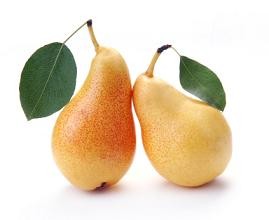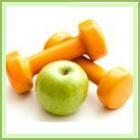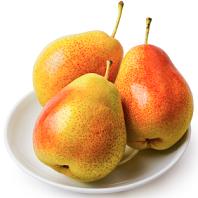Pear Nutrition Facts,
Health Benefits of Pears
All about pear nutrition facts, nutritional benefits of pears, calories in a pear, pear nutrients
Pears come in many varieties and have lots of health benefits. Pears are low in both calories and fat, and are great as an addition to your weight loss diet.
They contain more fiber (water soluble) and pectin than apples, therefore improving our colon health.
Pears also provide more potassium than apples to lower our cholesterol, ensuring our bowels function normally. A single pear provides as much fiber as a bowl of whole grain cereal.
Pectin forms a gel in the stomach which prevents absorption of the fats in food. Pectin is also a natural anti-diarrheal aid and helps to regulate blood sugar in diabetics.
They are also full of folic acid, which is great for blood formation. Pears contain copper and quercetin which is thought to help fight against free radicals, and boron which is believed to help keep our bones strong.
When buying pears, we need to be patient and wait until they are ripe and juicy to eat. If you’re impatient and want to speed up the ripening process, pop a pear in a paper bag with a ripe banana. Just don’t let the pear over-ripen. Pears taste fabulous with fresh nuts.
Compare pear nutrition facts to the other fruits.

Pear Nutritional Information
| Nutritional value per 100 g (3.5 oz) Refuse: 10% (Stem, core and seeds) Scientific Name: Pyrus communis |
||
|---|---|---|
| Proximates: | ||
| Nutrients | Pears, raw | Pears, dried, sulfured, uncooked |
| Water | 83.71 g | 26.69 g |
| Energy | 242 kJ (58 kcal) | 1096 kJ (262 kcal) |
| Protein | 0.38 g | 1.87 g |
| Carbohydrates | 15.46 g | 69.70 g |
| Total Fat: | 0.12 g | 0.63 g |
| Fiber | 3.1 g | 7.5 g |
| Cholesterol | 0 mg | 0 mg |
| Minerals: | ||
| Calcium, Ca | 9 mg (1 %) | 34 mg (3%) |
| Iron, Fe | 0.17 mg (1 %) | 2.10 mg (12%) |
| Magnesium, Mg | 7 mg (2 %) | 33 mg (8%) |
| Phosphorus, P | 11 mg (1 %) | 59 mg (6%) |
| Potassium, K | 119 mg (3 %) | 533 mg (15%) |
| Sodium, Na | 1 mg (0.04 %) | 6 mg (0%) |
| Zinc, Zn | 0.10 mg (0.6 %) | 0.39 mg (3%) |
| Copper, Cu | 0.082 mg (4 %) | 0.371 mg (16%) |
| Manganese, Mn | 0.049 mg (2.5 %) | 0.327 mg (16%) |
| Selenium, Se | 0.1 mcg (0.1 %) | 0.2 mcg (0%) |
| Vitamins: | ||
| Vitamin C | 4.2 mg (7 %) | 7 mg (12%) |
| Thiamine (Vit. B1) | 0.012 mg (1 %) | 0.008 mg (1%) |
| Riboflavin (Vit. B2) | 0.025 mg (1.5 %) | 0.145 mg (9%) |
| Niacin (Vit. B3) | 0.157 mg (0.8 %) | 1.372 mg (7%) |
| Pantothenic acid (B5) | 0.048 mg (0.5 %) | 0.153 mg (2%) |
| Vitamin B6 | 0.028 mg (1.4 %) | 0.072 mg (4%) |
| Folate (Vit. B9) | 7 mcg (2 %) | 0 mcg |
| Vitamin A | 23 IU (0.5 %) | 3 IU (0%) |
| Vitamin K | 4.5 mcg (6 %) | 20.4 mcg (26%) |
| Percentages are relative to US Recommended Daily Intake (RDI) for adults. | ||
Author: Lana Soko
You Might Also Like:
Like This Page?
|
Share This Page:
|
Search Our Site:

Free E-Book:
We Recommend:
Looking to get your body into great shape? Get the very best results for your efforts and money! Save your valuable time from surfing the internet. These are theBestselling Weight Loss Programs

Programs that work and have thousands of satisfied customers worldwide!

 |




